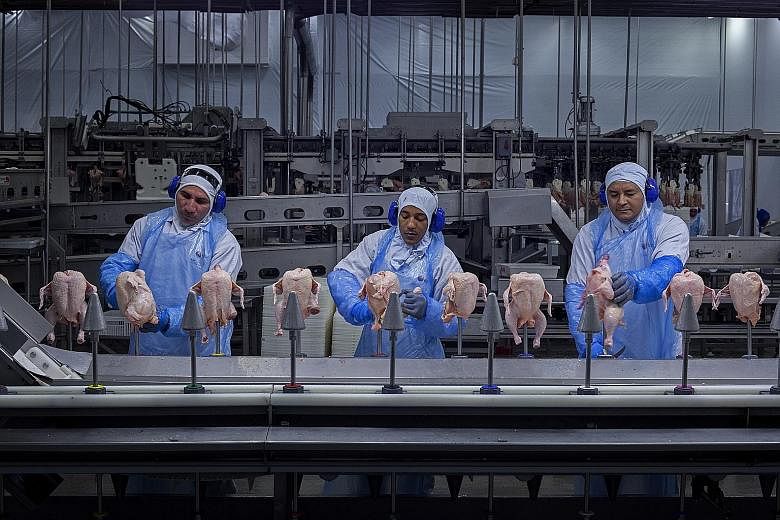LUCAS DO RIO VERDE (Brazil) • The ambitions are dizzying, some of the grandest in Latin America since thousands of labourers perished building railways through the forbidding jungles of Brazil more than a century ago.
China has sought to build a "dry canal" in the form of a railway across Colombia, linking the Caribbean to the Pacific. Chinese investors announced another huge venture in Honduras - two ports and a 603km railroad from sea to sea. Then this June, China announced yet another mega-railway - nearly 10 times as long - across Brazil and Peru, stretching from one coast of South America to the other.
But across the region, one large Chinese rail venture after another has come crashing against the hard realities of Latin American politics, resistance from environmental groups, and a growing wariness towards China.
While Beijing boasts of its rail initiatives around the world, it has often been stymied in Latin America, reflecting how even China's formidable ambitions have limits. Now, new worries over China's economic growth are raising more doubts about the blitz of what Beijing calls its "railroad diplomacy", as parts of Latin America reel from their dependence on China.
China is suffering an array of setbacks in railroad projects across the region, at a time when the demand for Latin America's commodities - like soya beans, iron ore, copper and oil - has slowed.
Last November, Mexico axed a Chinese-led bid to build a US$4.3 billion (S$6.2 billion) high-speed rail after claims that the Mexican government favoured contractors who were part of the consortium.
In Honduras, two years have passed since Chinese investors announced the railway linking the Caribbean Sea to the Pacific. Yet Mr Miguel Servellon, an official with the state agency promoting the project, said it was "still a long way from happening", listing obstacles like a complex environmental approval process.
In another project aimed at finding an alternative to the Panama Canal, Colombian President Juan Manuel Santos said four years ago that Colombia and China had a plan that was "quite advanced" to build a railway linking the Pacific to the Caribbean. But the mood has changed considerably since then.
In Venezuela, Chinese companies actually broke ground on a 466km high-speed rail, part of a grandiose plan by President Hugo Chavez to "rebalance" the population away from the coast.
But while Venezuela's government boasted that passenger service would start in 2012, the project has been fraught for years with work stoppages and money shortfalls on the Venezuelan side. The Chinese authorities say that more than half of the railway has been built, though Venezuelan news media reported in June that work camps on the route had been abandoned.
An even bigger project floated by a Chinese telecommunications tycoon, a 276km canal across Nicaragua - intended as a rival to the Panama Canal - has been met with broad scepticism about its feasibility as well as protests from farmers living along the proposed route.
Despite the obstacles, Beijing has pressed ahead with the twin-ocean railway across Brazil and Peru, building on trade between China and Latin America that surged to US$285 billion in 2014, from US$12 billion in 2000, according to figures from the International Monetary Fund.
Lucas do Rio Verde, a farming outpost of 70,000 people, could find itself almost in the middle of the proposed 5,310km route, raising hopes that it could be transformed into a major agricultural shipping hub.
But in the shadows of the grain silos towering over soya bean fields and the meat-processing plant here, the responses have often involved more shrugging than jumping for joy.
"I don't doubt that China has the money and know-how to make this happen," said Mr Ricardo Tomczyk, the president of an industry group representing soya bean farmers. But "we know that Brazil's bureaucracy is more formidable than building a railway across the peaks of the Andes".
Scholars of China's ties to Latin America say the proposed railway would go well beyond cutting shipping costs, reflecting Beijing's efforts to secure raw materials, improve its food security and find new markets for Chinese engineering and rail firms at a time when China's economic growth is slowing.
"The Chinese don't fully trust that the US won't try to restrict them at certain strategic choke points," said professor of Latin American studies R. Evan Ellis at the US Army War College Strategic Studies Institute, pointing to China's reliance on shipping lanes like the Panama Canal.
Some political leaders in Brazil and Peru have welcomed the Chinese rail proposal. But even some who stand to benefit acknowledge the vexing array of challenges.
"I don't want to be pessimistic about their railroad, but it will be very hard," said Lucas do Rio Verde's former mayor Marino Franz. Powerful political and business figures, whose river ports and soya bean processing centres could be threatened by the railway, are already blasting the Chinese venture.
"I don't believe in it," Senator Blairo Maggi, a soya bean farmer and former governor of Mato Grosso State, told his counterparts in the Senate.
With Brazil's economy ailing, some powerful officials are signalling that they may be willing to accept China's proposal, while also suggesting that the railway could be pursued with a less ambitious, piecemeal approach.
"The Twin-Ocean Railway could be done in parts," Brazilian planning minister Nelson Barbosa said in testimony before the Senate, emphasising in particular two stretches where farming groups have clamoured for railroads.
Mr Kevin Gallagher, a scholar at Boston University who studies China's forays into Latin America, said the railway ranks among the largest infrastructure projects in Latin America in the last century.
"China will have to race up the learning curve for this to succeed," he said. "If the Chinese can't make this happen, then no one can."
NEW YORK TIMES

